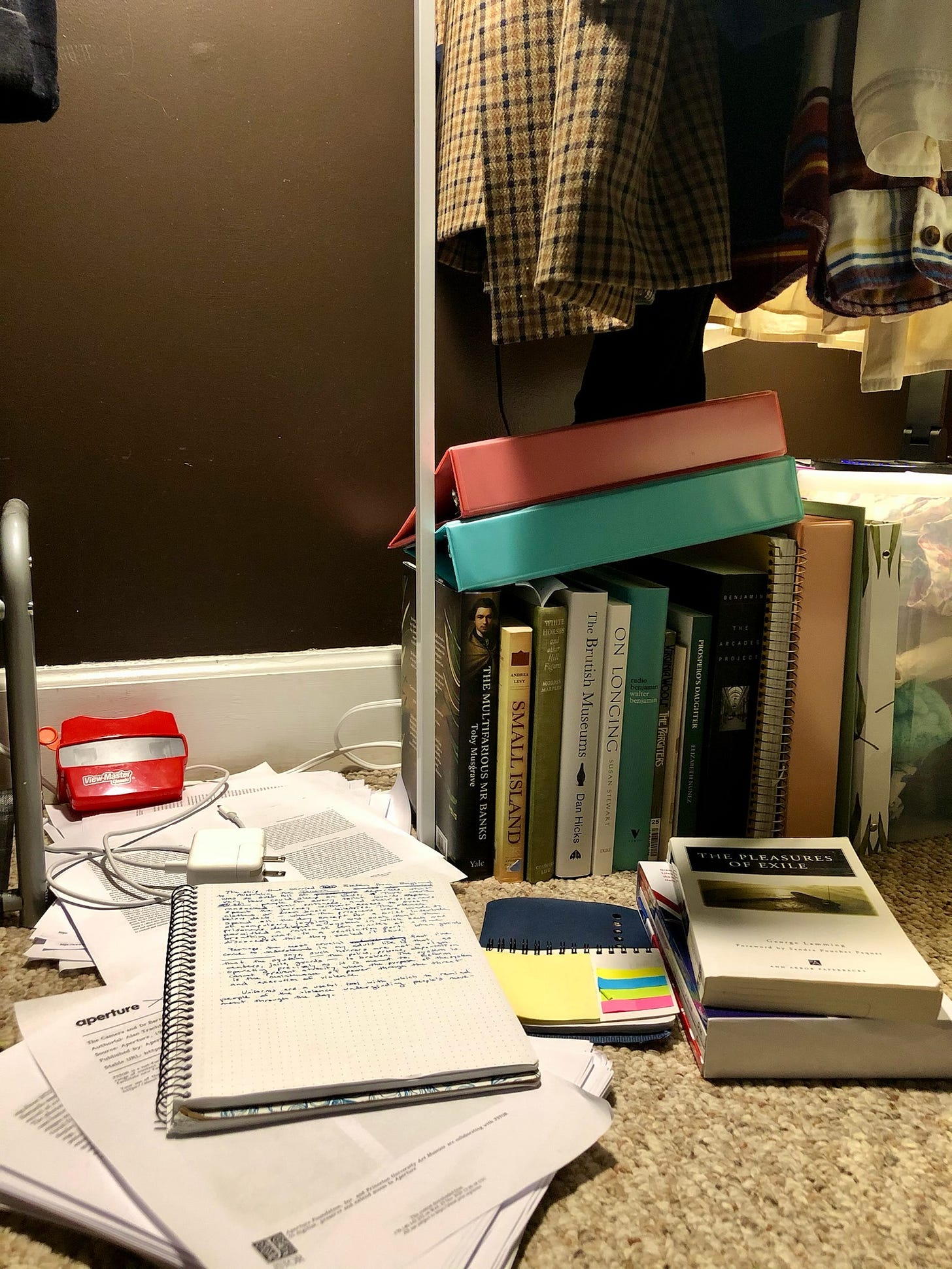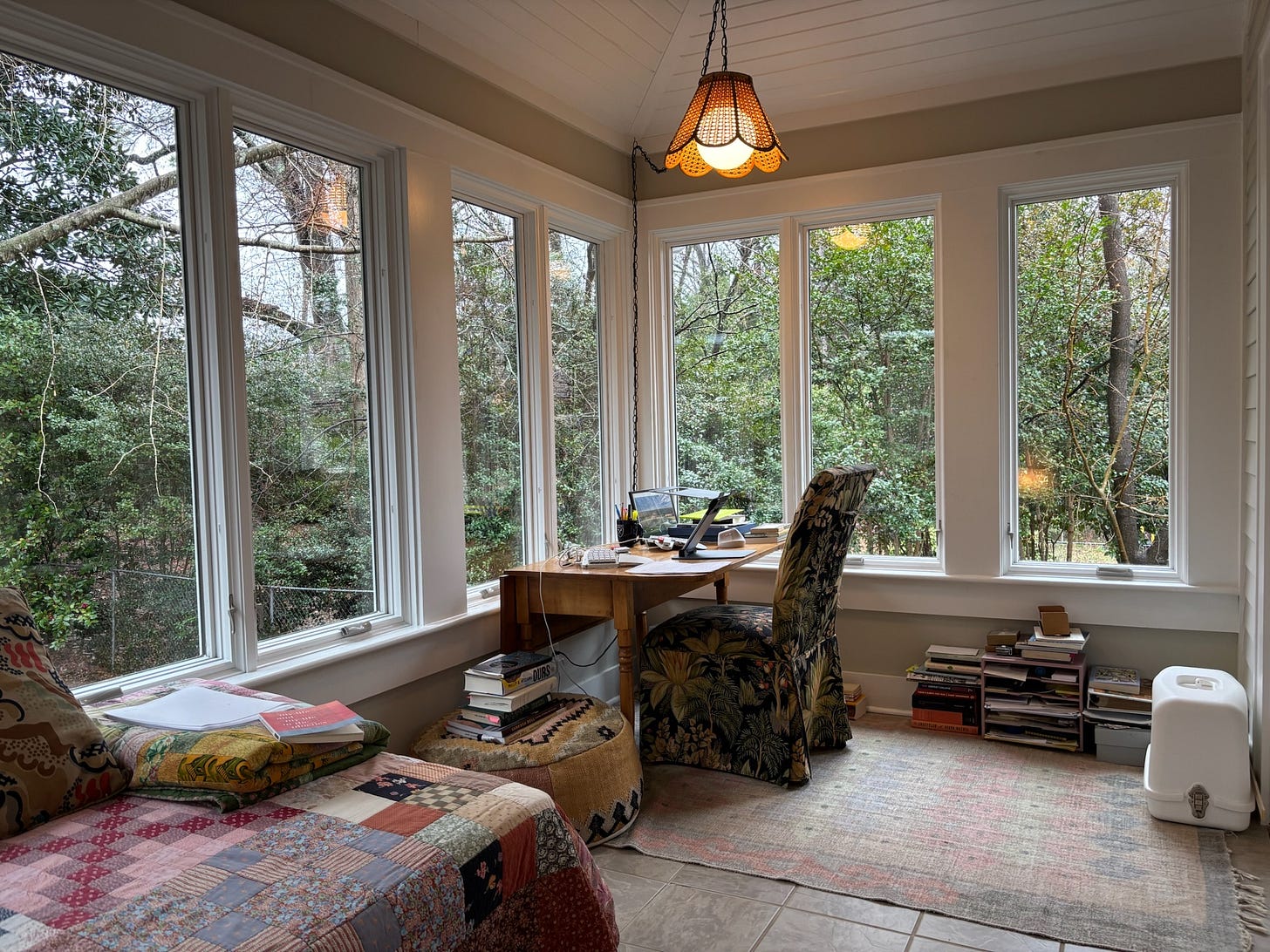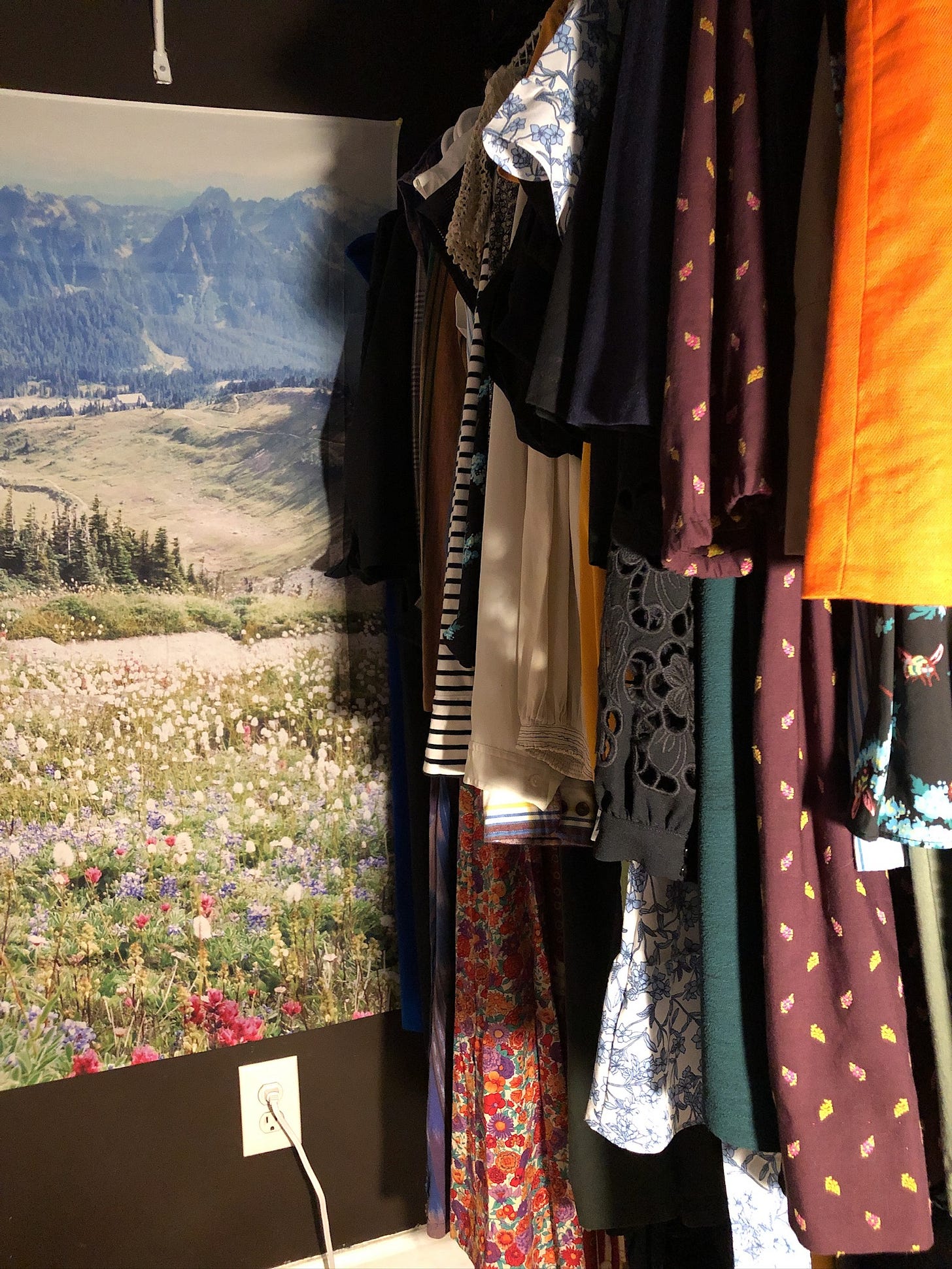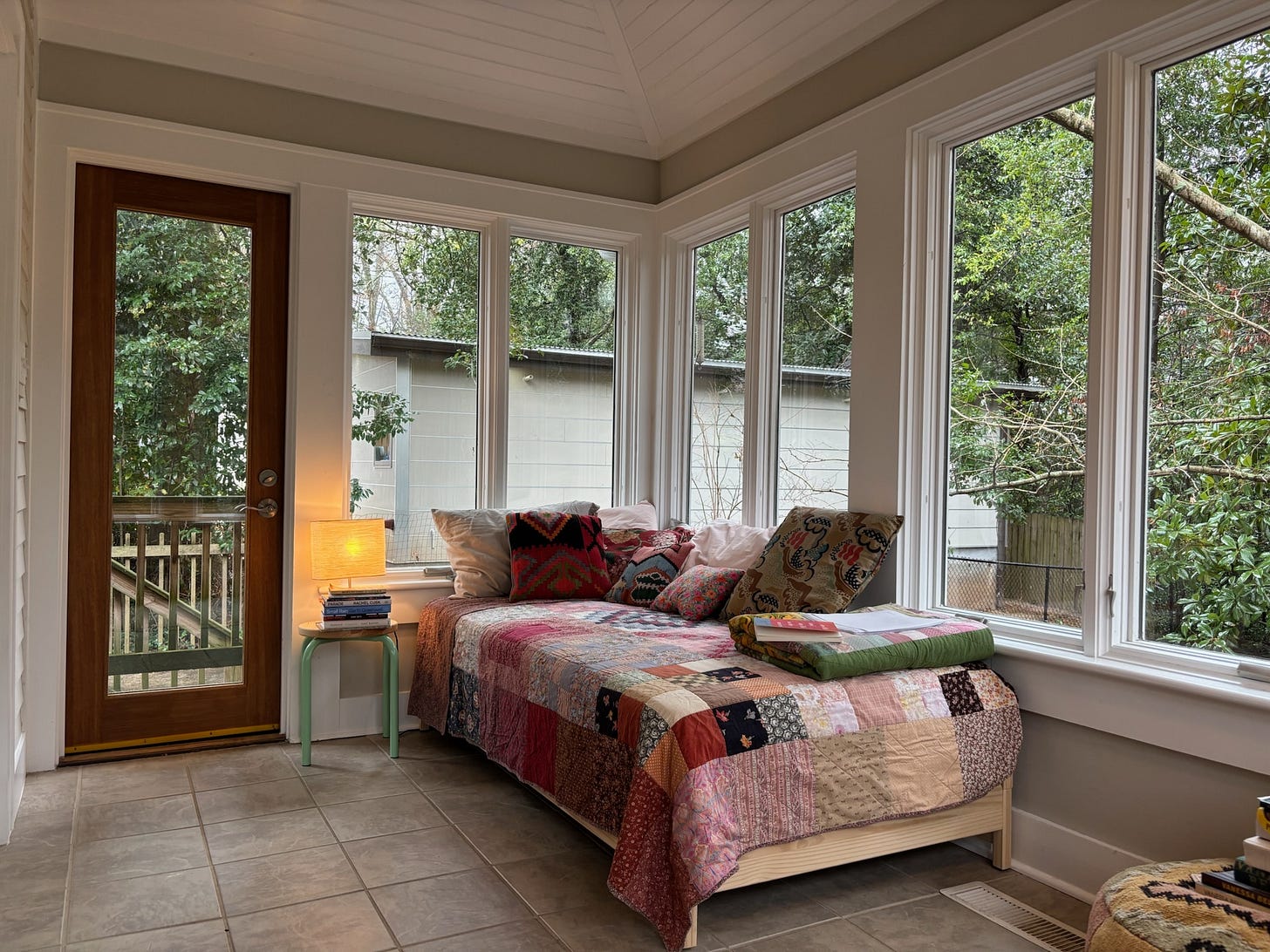Heather Christle is the author of In the Rhododendrons: A Memoir with Appearances by Virginia Woolf. In 2019, she published her first work of nonfiction, The Crying Book (Catapult), a New York Times Editor’s Choice, Indie Next selection, and national bestseller that was translated into eight languages, awarded the Georgia Book Award for memoir, and adapted for radio by the BBC. An Associate Professor of English and Creative Writing at Emory University, Christle is also the author of four poetry collections, including The Trees The Trees, which won the Believer Book Award. Her next book of poems, Paper Crown, will be out in August 2025. Her writing has been published in Elle, Granta, London Review of Books, The Nation, The New Statesman, and The New Yorker, and she was recently the recipient of a Howard Foundation Fellowship in nonfiction.
Where do you write?
These days I write in a room made entirely of windows, looking out into our back garden, with a beloved ginkgo tree right in view. Sometimes I am at the table, sometimes on a daybed. This is the opposite of the space in which I wrote the bulk of In the Rhododendrons: A Memoir with Appearances by Virginia Woolf: on the floor of a closet with walls painted dark brown.
We rented the house around the closet in the summer of 2019, thinking we’d only stay a year while we found our bearings (me in my new job at Emory, the family in our new lives in Atlanta), but then the pandemic struck and the uncertainty (financial and otherwise) of everything forced us to stay far longer than we had intended. The closet was the only place in the house where I could be at a meaningful distance from others. I have a hard time with sound. At first, the closet seemed fun, almost like a game. Then it became oppressive.
When it finally became possible to break out of there and return with my little yellow notebook to England (Woolf’s land in life and on the page, my mother’s nation, the country where I was sexually assaulted at age 14), I hardly knew what to do with myself. You know how if you press your arms against a doorframe for long enough, when you step away they rise up of their own volition? That’s what it felt like language did when at last I reached the places I’d been reading and writing about for years in the dark. I used a sentence from Woolf’s diaries as an epigraph for Part 3 of In the Rhododendrons, which maybe sums up the feeling of moving my body from the closet to the South Downs: “I will take my mind out of its iron cage and let it swim—this fine October.”
What can we always find on your desk?
Loose blank paper, and paper that was once blank, but now has a poem handwritten on it. Dead pens I have not yet thrown away. Books I am consulting or must read next. A split ergonomic keyboard I have started using since losing a rib to surgery (see Rhododendron’s epilogue).
Morning writer or late-night words?
Poetry in the early morning only, prose from mid-morning through afternoon. I don’t know why. I mean, I have theories, but I suspect it’s mostly habit.
Coffee, tea, nibbles?
So much coffee.
What’s your most tempting distraction?
The desire to share something wonderful I have learned with friends and strangers immediately.
What’s that we hear on the speakers?
Not a single thing. (Atmospheric sounds are whooshing cars on the road behind the trees at the end of the garden and a bunch of midfeast birds.)
Have you got any pre-writing rituals?
So much coffee.
Perfect bookshop to hide on a rainy day?
This is a hard one! My family spends a good deal of time at both Little Shop of Stories (which focuses on books for kids, but has a robust selection of books for adults as well), and at Charis Books (our local independent feminist bookstore). Before we moved across town, we’d go to Brave and Kind. I can vouch for all of them in the rain.
In a fantasy world, I would hide in the used bookshop where my partner grew up, Melville & Company, the store his parents owned in Port Townsend, Washington, which has been closed a long time, and which I never had the chance to see. Sometimes it feels like we live in a version of it; his parents have sent our child so many magnificent used books over the past decade, and my partner himself is now doing some book-dealing in his spare time, not to mention the many new and used books that continue to flock into the house. (We are in desperate need of more shelves.)
What’s your most treasured book?
I don’t know! Stories/attachments drape themselves over books with such sequined ease and then they all shimmy at me. My partner has managed to forage some that are literal treasures, but those tend to make me nervous. Maybe for now, I will say that I hold dear a pair he gave me when I finished a draft of Rhododendrons, a process that just about destroyed me. The books are first editions: Virginia Woolf’s The Years and Three Guineas, both published by Hogarth Press, which she and her husband Leonard founded. She had originally intended for the two books to be one, alternating between the story of the Pargiter family (Victorian era through her then-present day), and non-fiction/essays. She could not make it work; the project had to be two separate books. The essays became Three Guineas, in which she makes prescient observations of the fascism present within patriarchy’s inequitable power structures (and also imagines other ways of being). The fiction became The Years, a novel she struggled for years to complete.
Poems come to me easily. Nonfiction is much harder; I have the feeling I am simultaneously building and crossing a bridge across a great chasm to a land I cannot quite see until I arrive. It can be a comfort to look to Woolf’s diaries and see her grousing about how long it takes her to finish The Years. And to see how much she tore away! If you read from the manuscript she titled The Pargiters there's a whole scene that takes place at Kew Gardens at the outset of World War I (a site of great importance to my own family history, and therefore Rhododendrons). I think if you were to make a stack of pages I wrote and another of the pages that became my published book, the scale would tilt heavily on the side of those that will not see beyond the archival light of day.
Favourite word in the English language?
I marvel at all prepositions, but "to" in particular dazzles me. Imagine having the power to make absolutely anything an infinitive!
Dream writing location?
I'm pretty happy with my room of windows. I would not mind if the country around me changed into a less fascist and more open, courageous shape. Thank god for everyone who is trying. Including the birds and the ginkgo.
Three writers (dead or alive) to have dinner with?
I'd say Woolf, but I'm pretty sure she would not like me. Perhaps I could hide under the table and listen. In truth, I eat a lot of dinners with writers (alive) and until we are truly at ease, truly friends, I find such meals to be something of a challenge.
One poem that has changed your life:
"Archaic Torso of Apollo." (Forgive me.)









I feel like there aren't a great deal out there who Woolf would truly like. But nevertheless I too would love that dinner.